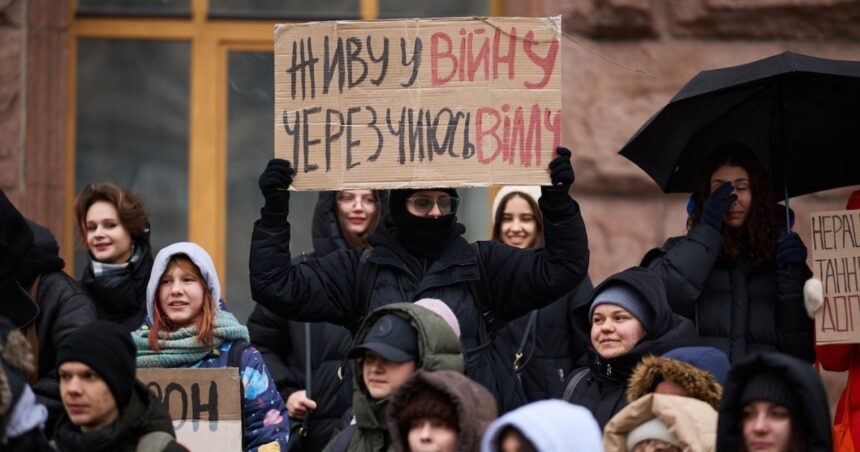Summary by Geopolist | Istanbul Center for Geopolitics:
Despite the ongoing war with Russia, corruption remains a top concern for Ukrainians. A significant portion of the population views local authorities and various sectors, including customs and the military, as corrupt. Efforts to combat corruption include independent anti-corruption organizations and new legislative measures. However, public perception remains skeptical, with many believing that corruption has increased, especially within the military. Addressing corruption is crucial for Ukraine’s international partnerships and postwar recovery.
Read more below.
Ukrainians See Corruption as a Key Issue Even during the War
The war unleashed by the Russian Federation in Ukraine is having a devastating impact on Ukraine. Despite unprecedented support from the United States and European countries, Ukrainians’ standard of living is declining, exacerbating preexisting issues. Yet, according to recent polls, corruption tops the list of domestic problems for Ukrainians. The current administration is trying various mechanisms to combat corruption, but are they enough?
The Sources of Corruption
For Ukraine, the problem of corruption is most acute among European countries. This can be explained by the slow post-Soviet changes in the country’s economy, frequent changes of ruling groups that politicize governmental institutions, and an entrenched habit of looking for private solutions to everyday issues. Quite often it is easier to bribe than to resolve problems using legitimate existing mechanisms.
The most noticeable manifestations of everyday corruption are observed at the communal level in Ukraine. According to an in-depth study of local government in Ukraine, 38 percent of respondents characterized local authorities as corrupt, 29 percent as nontransparent, and 23 percent as indifferent to people’s problems. At the same time, ordinary citizens themselves engage in corrupt schemes as well: 19 percent of respondents indicated that they personally had given a bribe to solve a problem with a medical institution and 8 percent did so with educational institutions.
The high level of corruption has slowed Ukraine’s progress in becoming a member of the EU and NATO. With the support of Western partners, Ukraine has been working to overcome the issue. Independent anti-corruption organizations, courts, and public associations have been created to rein in corruption schemes. Anti-corruption legislation is gradually growing teeth, but corruption persists and dominates other problems Ukrainians face.
Outrage over Rising Corruption Levels
Public opinion polls on corruption are conducted by both independent sociological firms and state organizations. The National Agency on Corruption Prevention presented the results of an expert sociological survey on the assessment of corruption levels in Ukraine in 2023. According to the study, the majority of representatives of the anti-corruption bodies (55 percent) consider corruption to be a significant problem, but this perception is better than the general population’s perception (88 percent) and that of the business community (81 percent). The top three most corrupt areas, according to analysts, are customs, the military sector, and public procurement.
A nationwide survey conducted in February of this year by the sociological group Rating identified the two biggest threats to Ukraine’s development as corruption in government bodies (51 percent) and Russia’s military aggression (46 percent). Moreover, concerns about corruption are higher in older cohorts.
Another nationwide public opinion survey, conducted from March 1 to 15, showed that 70 percent of surveyed Ukrainians agree that the government is profiteering from the war and increasingly sinking into corruption. This is a striking uptick from a year ago, when only 43 percent of respondents shared this opinion. Ukrainians are increasingly associating corruption in government with the military, which has more opportunities to engage in corrupt schemes, such as arms trade or evasion of mobilization.
Monitoring studies by Active Group record negative trends in the perception of corruption levels in Ukraine. If in January of 2023 only 15 percent of respondents thought that the level of corruption was increasing, by June of this year that figure had grown to 49 percent.
These findings are cause for alarm. Corruption not only affects the overall economic development level of the country, it also contributes to divisiveness in Ukrainian society, as evidenced by the results of a study by the Kyiv International Institute of Sociology.
Demands for Reforms and Positive Changes
As public awareness of the problem grows, so do demands for anti-corruption reform. According to a Gradus Research survey, conducted in May, Ukrainians identified the following reforms as top priority for the Ukrainian government to tackle: fighting corruption (identified by 72 percent of the respondents), strengthening defense capabilities (59 percent), and rebuilding the country (44 percent).
There are some positive signs. Most analysts consider the existing anti-corruption bodies in Ukraine to be independent and effective. The European Union Anticorruption Initiative finds that while corruption remains a serious problem in Ukraine, anti-corruption efforts and reforms can help reduce it. Anti-corruption bodies can be a key tool in this process. President Volodymyr Zelensky’s initiatives have also helped. For example, on July 5, 248 new local court judges, vetted by independent anti-corruption organizations, were sworn in. Renewing representatives of state authorities can help reduce the number of corrupt schemes.
Transparency International’s corruption perception index, which provides an opportunity to comprehensively monitor changes in the level of corruption in different countries, is of special importance here. In particular, the 2023 index shows continued improvement on the part of Ukraine, testifying to the country’s partial success in the fight against corruption. However, public opinion polls show that Ukrainians themselves are skeptical. This may have to do with the fact that citizens’ perception of the changes in corruption levels is fragmented: government reforms and legislative changes aim at the long term, and their results may not be immediately visible to the general public.
The War Complicates Things
Addressing corruption during wartime is difficult. The sprawling military sector is a key sticking point in reducing corruption. That is not lost on Ukrainians, both ordinary citizens and representatives of state bodies, whose belief that corruption in the military and in government has soared over the past months.
Still, Ukraine must continue targeting corruption to retain the trust of its international partners and ease their concerns. Ukraine’s partners, for their part, should support this effort by helping implement global anti-corruption best practices in Ukraine. Reducing corruption will also assist postwar recovery and strengthen Ukrainians’ faith in the rule of law and government institutions.
By Kateryna Odarchenko & Oleksandr Poznii
Source: Wilson Center







